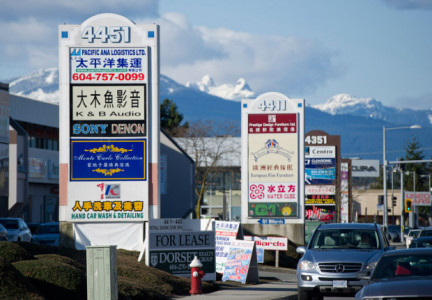Due to the pressure of Canadians who have complained about Richmond’s predominantly-Chinese signs, the city has signed a contract for some signs — those at bus stops — to be predominantly English.
“We’ve had the ongoing issue in Richmond about signs on businesses being in Chinese only or predominantly in Chinese, and there’s great concerns and complaints in the community.” said Richmond city spokesman Ted Townsend.
“We’ve always made it clear that it’s our desire that signs should be at least 50 percent English. In this case because the signs and bus shelters are on city land we can take a proactive approach and actually put in the requirement,” he said.
The signs on city land, Townsend said, would be “predominantly English.” The city’s move does not affect signs on property not belonging to the city, where most of the Chinese-language signs are located.
The city has been dealing with controversy over the use of Chinese language instead of English or combinations of both languages.
Over the past 30 years, the percentage of people who self-identify as Chinese living in Richmond has shot up from around 5 percent to over half, due to mass immigration into the area. In 1981, there were around 5,000 Chinese in the city; in 2011, 90,000, while white Richmondites have been leaving the city steadily over the same period of time. The current percentage of Chinese and white Canadians in the city is not known because more recent statistics are not available. The last Census was taken in 2011.
The matter of English requirements for signs came up in Richmond city business in 2013, when the local council voted against banning signs that do not contain English. In 2015, a petition for English only signs was also voted down by the council.
The city also recently made news for complaints from English tenants of a condo where the strata council, composed of Chinese speakers, decided to conduct all official business in Mandarin only.
Chinese Canadian strata council president Ed Mao had informed tenants that while they were free to come to meetings, the council had no intention of using English, the tenants reported.
One tenant filed a complaint with the B.C. Human Rights commission on behalf of himself and three others.
The issues of language for business and residential meetings are new ones for British Columbia. Neither has been the subject of legislation in the past, so no rules yet exist to restrict the use of languages in place of English.
